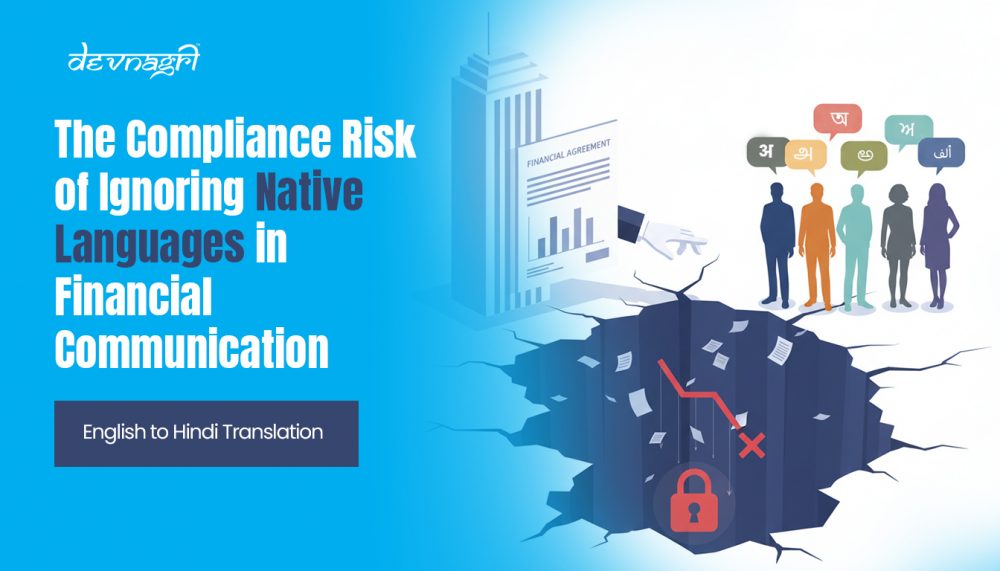Compliance in financial services is often framed as a checklist, regulations followed, reports filed, and audits cleared. But let’s be honest, compliance is really about trust. And here’s the thing many companies miss: if you communicate with customers only in English, you’re taking a huge risk. Not a tiny risk. A serious one.
India is diverse, with 22 officially recognized languages, and millions of investors spread across regions. Expecting every client to understand English perfectly is… well, optimistic at best. Many people are numerically savvy, yet the fine print in financial notices, investment updates, or risk disclosures can easily be misread or misunderstood. And in compliance, misunderstanding equals exposure.
Take a simple example. A fund company issues a change in its terms and conditions. Sent in English only. Some clients skim. Others misinterpret. One or two make decisions based on partial understanding. Regulators notice. Complaints pile up. What appeared like a tiny mistake suddenly turns into a big compliance failure that makes the news.
English Alone Isn’t Enough
Financial language is tricky. Words like “moratorium,” “NAV,” “debt,” “depreciation”, they’re not just vocabulary. They carry legal and fiscal weight. Miscommunicate them, and you risk client decisions that backfire.
Regulators are paying attention. Clarity, transparency, informed consent, these aren’t buzzwords anymore. They’re enforceable expectations. If a client doesn’t understand a notice because it’s in English only, technically, you might think you’re compliant, but the regulators might disagree. That’s a compliance gap you can’t ignore.
English to Hindi translation, and native-language communication more broadly, closes this gap. But here’s the catch: it’s not about swapping words. Literal translations can create more confusion than clarity. Context matters. Nuance matters. Regulatory alignment matters.
AI and Human Expertise: The Right Mix
This is where AI-assisted translation becomes a game-changer, if it’s done correctly. Generic tools? They’ll get the gist, maybe. But precision in finance? Critical.
Devnagri AI, for instance, uses neural machine translation engines trained specifically on financial and regulatory content. It knows what the situation is. It recognizes that “debt” isn’t just a word; it’s a legal term with consequences. But AI isn’t flawless. People still matter. Devnagri is fast like AI and knows a lot about language. Human reviewers look for accuracy in terms of rules, clarity in terms of context, and ease of reading.It knows what the situation is. It recognizes that “debt” isn’t just a word; it’s a legal term with consequences. But AI isn’t flawless. People still matter. Devnagri is fast like AI and knows a lot about language. Human reviewers look for accuracy in terms of rules, clarity in terms of context, and ease of reading.
For executives, the takeaway is simple:
- You reduce compliance risk without slowing down operations.
- Customers feel respected, they get information in the language they actually understand.
- Scaling multilingual communication is no longer a logistical nightmare.
Why It Matters Strategically?
Let’s be honest. Compliance isn’t the only reason to care. Multilingual communication drives engagement, retention, and trust. A client who receives updates in their preferred language is more likely to read them, understand them, and act appropriately. Fewer complaints. More satisfaction. Higher adoption of financial products.
And yes, this is measurable. Engagement metrics, complaint ratios, and even transaction uptakes improve. But there is another way to look at it: how people think about government. When you prove that you took steps to make language easy to comprehend during audits or inspections, it sends a strong message. Regulators see a school that is responsible, works hard, and knows about the risks.
Things Leaders Can Do
This is a genuine plan that works, not just a theory:
Look at your messages: What notifications, disclosures, or updates could be a problem if they are only in English?
Use AI to make things bigger: Use translation algorithms that have been educated on financial material to handle a lot of communication quickly.
Add a review from a person: Regulations need to be accurate and in the right context. Linguists make sure that the message is clear.
Repeat and make better: Get feedback from clients, pay attention to their worries, and make translations better. You can’t just “set and forget” compliance.
It’s not hard, but leaders need to be committed to it. The C-suite needs to regard multilingual communication as a strategic and compliance-critical project, not just something that would be good to have.
Real-Life Perspective
Imagine this: your company sends out a fund update, English-only. Some clients ignore it. Some misread it. A few make investment decisions that don’t align with their goals. Complaints start trickling in. A regulator calls. Suddenly, what seemed routine became a problem.
Now imagine the same update translated into Hindi, Marathi, or Tamil. Clients understand it fully. Engagement goes up. Fewer complaints, regulators see compliance that is proactive. The operational costs may go up a little, but the risk is lower and the trust acquired is priceless.
Leadership Responsibility
At the end of the day, ignoring native-language communication is a C-suite decision. CEOs, CFOs, and compliance heads must see it as strategic. Devnagri AI makes it possible. It combines the speed of AI with the knowledge of people to make sure that regulations are followed, that the information is accurate in context, and that clients are involved.
This isn’t about “speaking their language” merely for the sake of it. It’s about showing that you care, are careful, and think ahead. In a country as diverse as India, doing otherwise is simply risky.
Conclusion
The compliance risk of ignoring native languages is real, measurable, and avoidable. English-only communications leave gaps. Misinterpretations happen. Customers feel disconnected. Regulators notice.
AI-assisted English to Hindi translation, done correctly and with human control, fixes this. It makes things clear, lowers the chance of breaking the law, and develops trust. For CEOs, it’s an investment that pays off in better governance, more efficient operations, and better relationships with clients.
In today’s world of money, speaking your original tongue isn’t a choice. It’s important. And companies may easily use it with technologies like Devnagri AI. All three, compliance, clarity, and trust, are in line. No easy way out. No giving in.
Related Article: Building Multilingual Chatbots with English to Hindi Translation APIs



